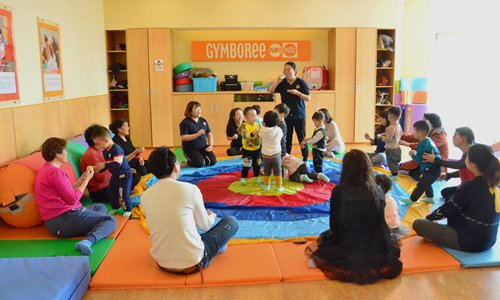Parents enrolling kids in EQ classes for headstart in life

Preschool children and their parents take class at an early education center in Xining, Northwest China's Qinghai Province on March 21. The center provides courses related to music, arts and life skills to children under 5. Photo: VCG
China's declining birth rate makes it more important to ensure the development of high-quality education so that Chinese talents can play a role in the world in the future.
In addition to enrolling their children in STEAM (science, technology, engineering, art and math) classes, which involve training their minds from a young age, many Chinese parents are now turning to EQ (Emotional Quotient) training.
EQ training for young children, even those under 3 years old, is becoming more popular. However, there has been heated discussion on the effectiveness of expensive emotional intelligence training at such a young age.
Some parents believe that EQ training for young children lays a good foundation for their future development. Others argue that toddlers are too young to improve their EQ and have doubts about whether a few lessons would have any effect anyway.
"The parenting process, and not commercial EQ training courses, is the key to developing emotional intelligence in their children, and this could be improved through professional instruction," Zhong Yujie, the executive vice dean of Beijing Guang'an Institution of TCM and Psychology, told the Global Times.
Worth the cost?
The BI-TO EQ Camp (BI-TO), founded in East China's Jiangsu Province in 2002, provides a specific set of EQ training courses for children under the age of 3, which has more than 200 branches all over China, according to BI-TO's official website.
Its curriculum focuses on three aspects: building self-awareness, which includes skills such as self-confidence, independence and problem-solving; learning self-control through developing a sense of responsibility, an understanding of rules, and the ability to manage their emotions; and social cooperative development which covers being resilient in the face of setbacks, and improving empathy and interpersonal skills, according to its website.
The curriculum is divided into five stages in line with the development phases of a child's emotional intelligence, starting from the first phase, which occurs at 9 to 12 months.
The course costs up to 10,000 yuan ($1,447) for 48 classes of 45 minutes each. One session, which is made up of two classes, includes 70 minutes of training for children and 20 minutes directed towards their parents, according to staff in its Beijing branch.
Parents' choices
Wang Mingmei, a 31-year-old mother in Daqing, Northeast China's Heilongjiang Province, told the Global Times that she will definitely send her 5-year-old daughter to the EQ class if its teaching can be shown to be effective.
She emphasized that "the tuition fee is around 10,000 yuan, which while not cheap is totally acceptable because a high EQ can benefit my daughter for her whole life."
Even with the second-child policy, Wang doesn't want any more children because of the high cost of raising them. As a result, she attaches great importance to her only daughter's education.
Wang doesn't buy into advertisements for EQ training institutions that claim to train children to become popular with everyone, but she believes a high EQ can bring her daughter confidence and optimism "with all the difficulties she will have to confront in life."
However, she has doubts over the professionalism of EQ trainers because of her previous experience at an early education center, which turned to be ineffective when her daughter was enrolled at 12 months old.
Cao Xiaoying, a 36-year-old mother in Deyang, Southwest China's Sichuan Province, said she is interested in EQ training courses, but the high fees put her off. She believes that her 4-year-old daughter is too young to improve her EQ.
Cao and her husband spend all their leisure time with their daughter visiting parks, baking food and reading books to her before bed every night. They believe that time spent with parents is the best education while their daughter is of kindergarten age.
However, Cao is considering sending her daughter to the EQ training institution or oral ability training class after she starts primary school to help her overcome her shyness with unfamiliar people.
In the past, being hardworking was seen as the most important personal quality to possess. But Cao now believes that having both a high EQ and IQ are required to have good development.
"In order to get my daughter used to the fierce competition in schools and society in the future, it is necessary to cultivate her emotional intelligence at an early age," Cao told the Global Times.
Expert's views
"Improving EQ is necessary for young children, but it is a long process that relies more on parental influence than on training courses," Zhong said.
She explained that it is wrong to assume that children under 3 are too young to improve their EQ, adding that emotional intelligence involves early interactions between infants and adults.
However, the high fees for EQ training are not necessary, Zhong said.
EQ training institutions may teach children methods of dealing with personal interactions, but EQ is actually an inner quality that will benefit them over the course of their lifetime, Zhong explained.
However, the high fees for EQ training are not necessary. EQ training institutions may teach children methods of dealing with personal interactions, but EQ is actually an inner quality that will benefit them over the course of their lifetime, Zhong explained.
Lin Zheyu, founder of Sprout Studio, an early childhood education center, told the Global Times, "The popularity of EQ training shows that Chinese parents are no longer focusing solely on their children's IQ or talents, but have developed an awareness of education for emotional intelligence."
However, she pointed out that the large number of EQ training institutions that charge high fees for their courses reflect Chinese parents' anxiety for their children to excel in every way.